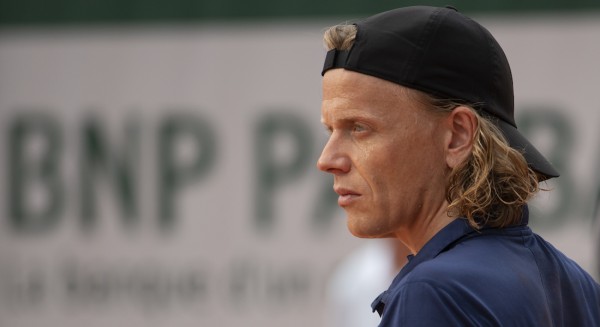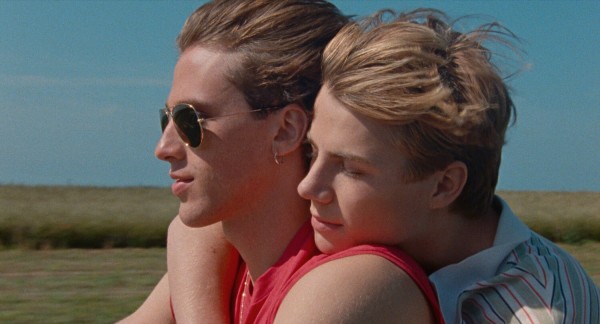-
FINAL SET/5ÈME SET (Quentin Reynaud 2020)
QUENTIN REYNAUD: FINAL SET/5ÈME SET (2020)

ALEX LUTZ IN FINAL SET
Last fling at Roland-Garros
Lutz is a comic who won three Cesar nominations for a mockumentary of a a French pop singer that he directed and starred in in 2018 called Guy. An Inrocks preview said he's "unrecognizable" in this new role in a serious film as a tennis player. But for his skill at transformation there was already his six-year performance as the blonde Catherine in the sketch series "Catherine et Liliane." This drama of a fading tennis player is a chance to do something serous and intense. He trained hard to prepare for it (though he learned shots, not games).
Lutz plays Thomas Edison, and plays his matches for us. He is a pro who at 17 was ranked as a young tennis prodigy but he has never shone. Now he is 37 and ranked 245th. (Lutz bravely plays young, five years older than his character). He gives tennis lessons, plays in obscure tournaments that net him only a few hundred euros more than the airline ticket and the fee. A contemporary has gone to osteopathy school and is happy with his new sports-related profession. Thomas, however, can't think of anything he was ever good of save the sport he's played since he was a small child. He has a shattered and arthritic knee that's been operated on three times; we look at the MRI.
As a last ditch attempt Thomas decides to try to compete in the French Open on the famous clay courts at Roland-Garros. High ranked young players are invited; he must qualify playing against hungry young athletes who will fight ruthlessly to get in. His wife Eve (Ana Girardot of Cédric Klapich's 2019 Deux Moi), once a tennis hopeful herself, and his tireless (increvable) mother Judith (Kristen Scott Thomas) advise him to give up. Thomas obsessively pushes forward.
He wins stage after stage with great effort. Then he arrives at the final one, and is matched with Damien Thosso (Jürgen Briand), the big French "jeune espoir" of the moment - whom he has encountered before only in the form of a cardboard life-sized figure pointing at him in a sporting goods store. Thosso is the mirror image of what he was 18 years before when he was badly beaten in the semi-finals, a trauma he has never really recovered from, though now, in a pubic interview, he denies thinking of the past.
This is both a conventional sports movie and not quite one. To do it credit it avoids easy drama. Everything is low keyed. But we work our way slowly and repetitiously through matches, with titles and scores, towards a big finale. It's inevitable. Tennis is what this is about. It's not, like Hitchcock's Strangers on a Train, a thriller with a tennis match as an element of thriller suspense. Here the match is the center of the action. Thomas' wife, his mother, even his tiny boy are accoutrements aiding or marring his game in this last ditch effort.
As for Lutz, he looks a bit sad and, as Thomas' tennis maven mom tells him, he looks tired, but he also looks athletic and youthfully stylish with his blond locks and man-bun. We know the glamor of sport tennis has. The film without fanfare flashes the cool accoutrements, the silver cups, the rows ad rows of classy sports clothing, the photos (which, however are of Thomas age 17), and when he gets close to the finals, he's given a little scent mark to promote on his shirt, €5,000 a game. (The scene where this is offered is a rare moment of humor.) But the press reminds him of his failed career and his mother's criticisms. The courts transport car is denied to him now, reserved "for the top players." It is with all this behind him and in our mind that Thomas enters that final game against Thosso - whom his former coach has bet on against him.
The crucial match is well done. It's nice to see the last games entirely announced in French for the two French players, with young kids watching excitedly back at the tennis club. This is a very European sports movie after all, rueful, aware of the consequences, pro, balanced, neither starry-eyed and gushy nor facilely pessimistic. Although the final match against Thosso is duly climactic, it's really the whole process that is the focus for us to ponder afterward, not merely the outcome.
Director Reynaud himself, AlloCiné reports, played tennis at a very high level for a long time. He understood the rich meaning of the Rolland-Garros qualifying trials. Many of his friends were very promising. But "tennis is a pitiless sport: many saw their hopes dashed." Though a passionate horseman, Lutz had never played tennis. He trained four hours a day for four months to prepare for this role. It paid off in a solid, thought-provoking film about the mercilessness of the most competitive of sports when played at the highest level.
Final Set/5ème set, 105 mins., debuted Aug. 2020 at Angoulême and showed in Sept. at Zurich. Screened online at home for this review as part of the all virtual Rendez-Vous with French Cinema Mar. 13, 2021. Release in France Aug. 18, 2021. See the preview interview with Reynaud and Lutz in AlloCiné.
Last edited by Chris Knipp; 06-16-2021 at 01:43 PM.
-
SUMMER OF 85/ÉTÉ 85 (François Ozon 2020)
FRANCOIS OZON: SUMMER OF 85/ÉTÉ 85 (2020)

BENJAMIN VOISIN, FÉLIX LEFEBRE IN SUMMER OF '85
A period gay teen fantasy romance where idyll turns to tragedy
It seems Ozon's latest, a tale of teen gay love that ends tragically, is a movie he would have liked to make when he started; he read the source novel as a teenager. But actors were too inhibited then. Now with Call My By Your Name etc. any young actor is ready to play gay. This is a fantasy of summer romance. Two boys meet where they live on the French Riviera, they have six weeks of happiness, it all goes wrong, one dies, the other gets in serious trouble, but somehow it all smooths over. The pact that whoever lives will dance on the other's grave was observed. But the living boy was hauled into court for desecrating a burial place and thought crazy, and possibly dangerous. The central event is the romantic, sexual fling between the two boys, with the older boy dominating the younger, but then there are all the events and people surrounding this.
Ozon does everything with his usual facility, which is his blessing and his curse. His screenplay adapts the original 1982 Aiden Chambers YA novel pretty faithfully, not only as to the content but also the storytelling method - and the variations in tone from solemn to farcical. The latter have been held against the director by some critics but are not a matter of being arbitrary or unfaithful to the source. Maybe it's all part of the giddy mood swings of adolescence. It's also part of Ozon's love of approaching seriousness with an air of provocation.
In Summer of 85 a scary meet-cute permits an older boy to take charge of the younger and make him his temporary lover. Alexis (Félix Lefebvre) -- who is recalling all this for a social worker via his lycée French teacher (a well disguised Melvil Poupaud) was trying a tricky maneuver in his little sailboat to escape a storm when the boat capsized, and he was rescued by David Gorman (Benjamin Voisin), who brings him home to his nutty, overeager mother (Valeria Bruni Tedeschi). A symphony of blithe inappropriateness, she takes the boy up to the bathroom, strips him, and washes him. She calls him "little rabbit," pets him, and gushes about how happy she is David has found - another - friend. Her husband, David's father, is recently dead and they are running the shop he started to support themselves; it emerges later David has had some unsavory friends. Alex is as sweet and correct as anyone could want.
Soon David, who happens to be Jewish, is taking over Alex, taking him to the movies, in his boat, above all on daredevil rides on his motorbike which he speeds in not knowing he's speeding, in a bubble perpetually chasing a phantom of speed, as he tells it. Alexis also comes to work at the shop with David and his mother. It's summer; his parents don't see much of him.
All this unfolds in flashback, and Alexis, who prefers Alex now, starts by announcing that his lover, David, is dead. The tragedy follows a terrible conflict over an English au pair girl, Kate (Philippine Velge) who's been turning up for a while. David takes her up, and drops Alex. This is a dramatically heightened version of the heartbreak of young love (or lust) that quickly passes but leaves lifelong pain.
François Ozon's new movie may function as a kind of delicately lurid wish fulfillment fantasy for gay men, particularly perhaps ones who were 16 in the mid-eighties, especially since eighties pop music like The Cure, Bananarama, Movie Music, Rod Stewart’s "Sailing" is threaded through the film at all the most opportune moments, and dancing is not only done on David's unmarked Jewish grave, but in a disco with a classic reflecting ball overhead.
The fluent, incredibly prolific Ozon makes movies that are always worth taking a look at. Not all are on a level with Under the Sand, 8 Women, Swimming Pool, and In the House, to name a few obvious bests. Yet if we look at his last three, Franz, Double Lover, and BY the Grace of God, I would not discrcommend any of them. The important and astonishing one is [I]By the Grace of God[/I, a serious and realistic examination of pedophile priests and the aftereffects of their abuse on several very different men. Ozon never did anything so serious, yet he carries this off perfectly. Anglophone critical reactions to Ozon's films seem to be in the "meh" category; some of the nuances may be missed.
But the point is Ozon is interesting when seen as a consistent yet multifaceted auteur, even if most of the time a far from serious one. His œuvre is best when each film is surveyed in the perspective of others, comparing the films to see their interesting interconnections. In a way he has never done anything so flagrantly, joyously, nostalgically gay as Summer of 85. But the interest in sex and love, excessive romance, and dangerous acquaintances runs through the œuvre from first to last. This one goes by a little too quickly. As Benjamin Lee wrote, Summer of 85 "doesn't haunt" as it should, "fades when it should burn." But this sensuous film may very well begin to glow with multiple viewings.
Félix Lefebvre and Benjamin Voisin were both nominated for for Meilleur espoir masculin at the César awards two days ago. Nominated for 12 César Awards including Best Film, Best Director, and Best Adapted Screenplay.
Summer of 85/Eté 85, 90 mins., was part of the Cannes Official Selection May 2020, and debuted at Lyon Jul. 2, 2020, opening theatrically - desired by Ozon to have Hichame Alaouie's beautiful, bright 16mm images seen on the big screen, in France Jul. 14, 2020. Screened at home online for this review as part of the all virtual Rendez-Vous with French Cinema Mar. 14, 2021. AlloCiné press rating 3.9.
See Mark Kermode's admiring Guardian review for more detail.
Last edited by Chris Knipp; 03-14-2021 at 10:09 PM.
 Posting Permissions
Posting Permissions
- You may not post new threads
- You may not post replies
- You may not post attachments
- You may not edit your posts
-
Forum Rules





 Reply With Quote
Reply With Quote

Bookmarks